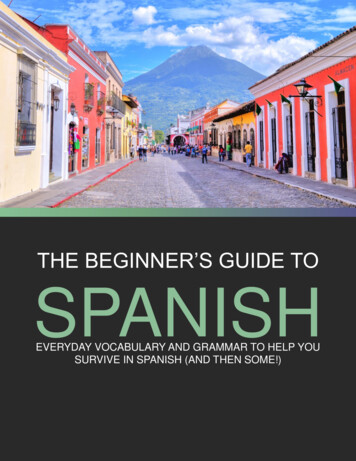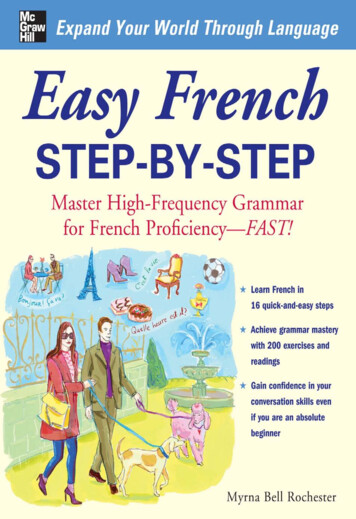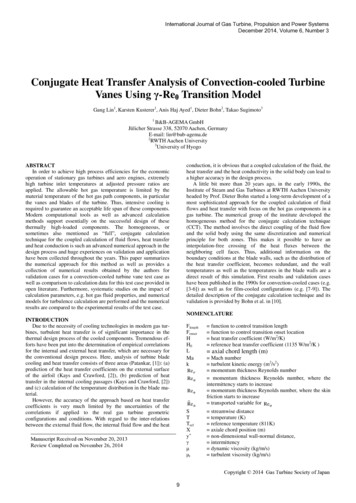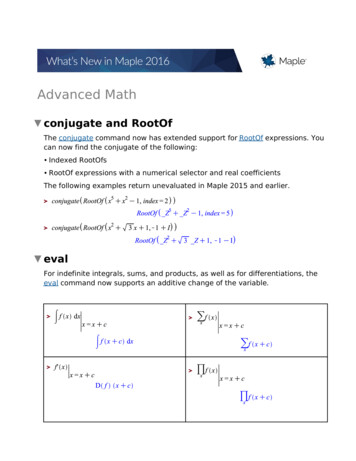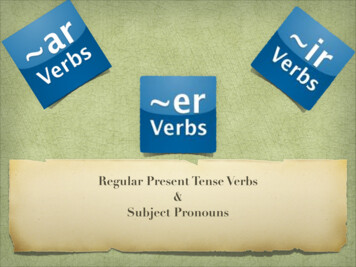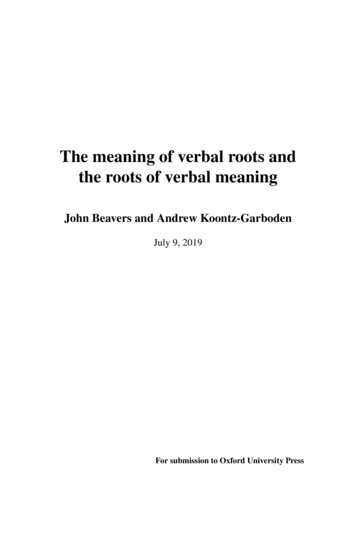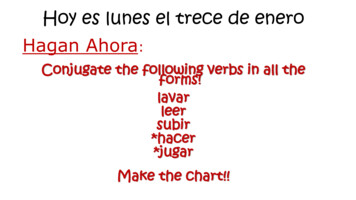
Transcription
How to conjugateFrench verbsElsa French TeacherUnderstand how to conjugate the principal tenses inFrenchwww.elsafrenchteacher.com
How to conjugateFrench verbsElsa French TeacherA question of logicA holistic visionThe most important thing is to have a global understanding of the rules.That’s what I will try to give you through this guide: a global vision.First, what you need to understand is that you have two types of tenses inFrench: the simple tenses and the compound tenses (temps composés).The tenses arepresented inthe followingorder :1. Présent2. ImparfaitThe simple tenses are made of one part.The compounds tenses are made of two parts:the auxiliary and the past participle.3. Futur etThen, it’s crucial to understand that for each simple tense there is acompound tense:conditionnelHow to conjugate French verbsMy students always tell me grammar and conjugation are complicated.In fact, they are complex, but not complicated if you have a good method tolearn them.4. Passé-composéand the tempsPrésent passé-composéFutur futur antérieurConditionnel conditionnel passéImparfait Plus-que-parfaitSubjonctif subjonctif passécomposés5. Subjonctif6. RecapSome precisionIn this guide I aim to give you a clear, practical and global understanding.I am not:- Talking about the passé-simple tense which is rarely used (mostly in fairytales, history books and some novels)- Explaining the use of the tense which is another subject. Here we’ll seehow to conjugate.- Talking about other tenses you could find in some conjugation books andwhich are not used nowadays. elsafrenchteacher.com1
1/THE INDICATIF PRESENT AND THE 3 GROUPSFor all the tenses, the verbs are divided in two parts:1. What we call le radical2. The ending which is called la terminaison (ending).For each tense I will detail what is the radical and what is the terminaison.dependson thegroupinfinitifwithoutendingsex : MANGER ePrésent je mange(I eat / I am eating)The infinitif (infinitive in English) is the form which is not conjugated and thatwe use to name the verbs. Ex: manger, dormir, faire, dire Ex : AIMERj'aimetuaimesil / elle / on aimenousaimonsvousaimezils / ellesaiment2e GROUPE-is-is-it-issons-issez-issentEx : FINIRjefinistufinisil / elle / onfinitnousfinissonsvousfinissezils / ellesfinissentAll the -ER verbs except aller.All the 2nd group verbs have an infinitive endingwith -IRHow to conjugate French verbs1er GROUPE-e-es-e-ons-ez-entBut not all -IR verbs are part of the 2nd group.Some belong to the 3rd. You’ll find a list of verbs that belong to the 2ndgroup on the next page.The verbs of the 3rd group have three models of endings.3e GROUPEGeneralyEx : METTRE-DRE (except -oindre)Ex : PRENDREpouvoir valoir vouloirje / j'tuil / elle / onnousvousils / peuventNote : there are some exceptions : dire (vous dites), faire (vous faites) . elsafrenchteacher.com2
3 very important verbs to master:je / j'tuil / elle / onnousvousils / setessontvaisvasvaallonsallezvontThese 3 verbs will be used as auxiliaries to build other tenses: Etre et Avoir are the auxiliaries for the passe-compose (see lesson).Aller helps to build the futur proche (see below).ALLERINFINITIFpresentformex :je vaisFuturprocheof the verb manger je vais manger(I am going to eat)IMPERATIFWith the present we can also build another tense : l’impératifHow to conjugate French verbsFUTUR PROCHEIt has only 3 persons (tu, nous, vous)We conjugate it like the present, except that we take off the ‘s’ at the end of the ‘tu’form (for the -ER verbs only).-ER verbsOtherNégationRegarde ! Va !Regardons ! AllonsRegardez ! AllezPrends !Prenons !Prenez !Ne regarde pasNe prenons pasNe partez pasIrregular nssoyonssachonsayezsoyezsachez3veuillez elsafrenchteacher.com
LIST OF VERBS IN EACH GROUP1st group verbs -ER verbs except ‘’aller’’.2nd group verbsaccomplir - s’accroupir – adoucir - affaiblir - affranchir - agir – agrandir - alourdir alunir - appauvrir - applaudir - approfondir - arrondir - assombrir - assortir S’assoupir - assouplir - S’attendrir - atterrir - avertir - bannir de - bâtir - bénir blanchir - choisir - compatir à - convertir - définir - se dégarnir - démolir - désobéir à divertir - durcir - éblouir - éclaircir - élargir - embellir - emboutir - s’endurcir - enfouir engloutir - s’enlaidir - s’enrichir - envahir - s’épanouir - établir - s’évanouir - faiblir finir - fleurir - fournir - franchir - frémir de - garantir - garnir - gémir - grandir - grossir- guérir - investir - jauni - jouir de – maigrir – mincir - moisir - noircir - nourrir - obéirà - obscurcir - pâlir - pervertir - punir - raccourcir - rafraîchir - rajeunir - ralentir ramollir - réagir à - reconvertir - réfléchir à - refroidir - se réjouir de - remplir resplendir - rétablir - rétrécir - réunir - rôtir - rougir - saisir - salir - surgir - ternir trahir - unir - vieillir - vomir3d group verbsSubgroup 1 other -IR verbstenir - s'abstenir - appartenir - contenir - détenir - entretenir - maintenir - obtenir retenir - soutenir - venir - advenir - convenir - devenir - intervenir - parvenir prévenir - provenir - redevenir - revenir - se souvenir - subvenir - surveniracquérir - conquérir - s'enquérir - reconquérir - requérirsentir - consentir - pressentir - ressentirmentir - démentirpartir - repartirsortir - ressortirvêtir - dévêtir - revêtirouvrir - couvrir - découvrir - redécouvrir - recouvrir - entrouvrir - rouvrircueillir - accueillir - recueillirassaillir - saillir - tressaillir - défaillirdormir - endormir - rendormircourir - accourir - concourir - discourir - encourir - parcourir - recourir - secourir servir - desservir - resservirfuir - s'enfuir faillir - mourir - bouillir- se repentir - offrir - souffrir elsafrenchteacher.comHow to conjugate French verbs some -IR verbs4
Subgroup 2 -OIR verbsrecevoir - apercevoir - assavoir - concevoir - décevoir - percevoir - voir - entrevoir prévoir - revoir - entrapercevoir - pourvoirmouvoir - émouvoir - promouvoirfalloir - valoir - équivaloir - prévaloir - revaloirvouloir - s’asseoir - savoir - devoir - pouvoir - pleuvoirapprendre - comprendre - désapprendre - entreprendre - méprendre - prendre réapprendre - reprendre - surprendre résoudre - absoudre - dissoudrecoudre - découdre - recoudre moudre - remoudre adjoindre - astreindre - atteindre - ceindre - contraindre - craindre - dépeindre déteindre - enfreindre - enjoindre - éteindre - étreindre - feindre - geindre - joindre- peindre - plaindre - rejoindre - repeindre - restreindre - teindreattendre - condescendre - confondre - correspondre - défendre - démordre descendre - détendre - distendre - distordre - entendre - épandre - étendre - fendre fondre - mordre - morfondre - pendre - perdre - pondre - prétendre - redescendre réentendre - rendre - répandre - reperdre - répondre - retendre - retondre - retordre- revendre - sous-entendre - suspendre - tendre - tondre - tordre - vendrecorrompre - interrompre - rompreabattre - battre - combattre - débattre - ébattre - rabattre - admettre - commettre compromettre - émettre - mettre - omettre - permettre - promettre - remettre retransmettre - soumettre - transmettreparfaire - stupéfaire - contrefaire - défaire - faire - redéfaire - refaire - satisfaire surfaire - braire - distraire - extraire - soustraire - traireconvaincre - vaincre - taire - complaire - déplaire - plairenaître - repaître - paître - apparaître - comparaître - connaître - disparaître méconnaître - paraître - réapparaître - reconnaître - reparaître - transparaîtreaccroître - décroître - croître - recroître croire - boire éclore - clore inclure - conclure - exclure - reclure - poursuivre - suivre - revivre - survivre - vivreélire - lire - réélire - relire - dire - redire - contredire - dédire - interdire - médire prédire - circonscrire - décrire - écrire - inscrire - prescrire - proscrire - réinscrire retranscrire - souscrire - transcrire - confire - déconfire - frire - refrire - circoncire suffire - rire – sourireluire - reluire - nuire - conduire - construire - cuire - déconstruire - déduire détruire - éconduire - enduire - induire - instruire - introduire - produire reconduire - reconstruire - recuire - réduire - réintroduire - reproduire - séduire surproduire - traduirefoutreSubgroup 4aller elsafrenchteacher.comHow to conjugate French verbsSubgroup 3 -RE verbs5
2/ FUTUR ET CONDITIONNELThe characteristic of these tenses is that they are built from the INFINITIF so you willalways hear a ‘R’ before the end. It’s a good way to distinguish them from the other tenses,especially orally.Je . aiTu . asIl anous onsvous .ezIls . ontfuturendingsINFINITIFFuturSame as avoir in the present aiconditionalendingsINFINITIF je mangerai (I will eat)Je . aisTu . aisIl aitnous ionsvous .iezIls . aientConditionnelSame as in the imparfaitex : manger ais How to conjugate French verbsex : mangerje mangerais (I would eat)Irregular verbs r/Condj'enverrai/sje courrai/sje pourrai/sje mourrai/sje viendrai/sje tiendrai/sTranslationTo sendTo runcanTo dieTo comeTo holdInfinitifFutur/CondImportant verbsAVOIRj'aurai/sÊTREje serai/sSAVOIRje saurai/sFAIREje VOIRPLEUVOIRil vaudra/itil faudra/itje voudrai/sje devrai/sje recevrai/sil pleuvra/itTo be worthHave toWould likeShouldTo receiveTo rainChange of i/sJETERJe jetterai/sPAYERJe paierai/sAPPELERJ’appellerai/s elsafrenchteacher.comTranslationTo haveTo beTo knowTo do / makeTo goTo employTo wipeTo throwTo payTo call6
3/ IMPARFAITRadical ofthe presentof 'nous'formendingsof theimparfaitJe . aisTu . aisIl aitnous ionsvous .iezIls aientimparfaitSame as in the conditionnel ais InfinitifPrésentImparfaitAimerNous aimonsNous aimionsFinirNous finissonsNous finissionsPartirNous partonsNous partionsVouloirNous voulonsNous voulionsFaireNous faisonsNous faisionsVenirNous venonsNous venionsSpelling changes :infinitifPrésentImparfait-GER verbsMANGERNous mangeonsNous mangions-CER verbsLANCERNous lançonsNous lancionsinfinitifPrésentImparfait-YER verbsPAYERNous payonsNous payions-IER verbsETUDIERNous étudionsNous étudiionsje prenaisHow to conjugate French verbsex : pren(I was taking)Strange but regular :Irregular verb :7EtreJ’étais / Tu étais / Il était / Nous étions / Vous étiez / Ils étaient elsafrenchteacher.com
4/ PASSE-COMPOSE1Choose theauxiliaryETREAVOIR'se' verbs17 verbs of''movement''ex : se leverse promener etc.All the otherverbsdevenir, revenir, monter, retourner, sortir, venir, arriver, naitre, descendre, entrer,retourner, tomber, rester, aller, mourrir, partir, passer revenir, remonter, repartiretc.2Add the pastparticipleendings.é.i.is.uotherHow to conjugate French verbsYou'll find nice representations on the web (the house, the stairs etc.) click hereExamples- é : all the first group verbs être- i : finir, grandir, choisir, rire, suivre, dormir, partir - is : prendre apprendre, comprendre, s’asseoir, mettre - u : avoir, lire, voir, boire, vouloir, devoir, pouvoir, savoir,entendre, attendre, répondre, connaître, courir, perdre, vendre,croire, disparaître, plaire, pleuvoir, recevoir, venir, vivre - it : dire, écrire, conduire, traduire - ait : faire - eint : éteindre, peindre, atteindre 8- aint : craindre - ert : ouvrir, offrir, souffrir, couvrir, découvrir - ort : mourir To find other examples on the web click here elsafrenchteacher.com
Some verbs can use ‘Etre’ and ‘Avoir’ as auxiliaries !Which are they, and why can they have both ?These verbs are : sortir, rentrer, passer, descendre, monter, retourner.Usually we use them with ‘être’, but if there is a direct complement (direct object)after, we need to use ‘avoir’.Examples :EtreAvoirIl est sorti dans la forêt.Je suis rentré à 8 : 00.Vous êtes passés par ici.Nous sommes descendus.Nous sommes montés.Ils sont retournés au supermarché.Il a sorti les poubelles.J’ai rentré la table dans la maison.J’ai passé l’aspirateur dans le salon.Nous avons descendu l’escalier.Nous avons monté la rue à pied.Ils ont retournés le matelas.All the compound tenses follow the model of the passé-composé.1 You choose the auxiliary2 You conjugate it with the corresponding tense:TenseAuxiliarypassé-composéprésentfutur antérieurfuturconditionnel tif passésubjonctifHow to conjugate French verbsLES TEMPS COMPOSES3 The past participle is always the same.TenseAuxiliaryPast participlepassé-composéJe suispartifutur antérieurJ’auraiapprisconditionnel passéTu auraismangéPlus-que-parfaitIl avaiteusubjonctif passéNous ayonssu elsafrenchteacher.com9
5/ SUBJONCTIFRadical ofthepresent of'ils' formJe . eTu . esIl enous ionsvous .iezIls . entendings ofthesubjonctifSubjonctifSUBJONCTIFJe parsIl faut que je PARTeTu parsIl faut que tu PARTesIl partIl faut qu'il\elle\on PARTeNous partonsIl faut que nous PARTionsVous partezIl faut que vous PARTiezIls PARTentIl faut qu'ils\elles PARTentSome verbs change form in the ‘nous’ and ‘vous’ present form.We need to keep this change in the subjonctif.VENIR : verbe avec alternancePRESENTSUBJONCTIFJe viensIl faut que je VIENNeTu viensIl faut que tu VIENNesIl vientIl faut qu'il\elle\on VIENNeNous venonsIl faut que nous venionsVous venezIl faut que vous veniezIls VIENNentIl faut qu'ils\elles VIENNentOther verbs :Tenir que je tienne que nous tenionsmourir que je meure que nous mourionsrecevoir que je reçoive que nous recevionsboire que je boive que nous buvionsdevoir que je doive que nous devionsprendre que je prenne que nous prenionsappeler que j’appelle que nous appelionscroire que je croie que nous croyionsvoir que je voie que nous voyionsfuir que je fuie que nous fuyions-yer verbs que je paie que nous payionsHow to conjugate French verbsPARTIRPRESENTSome verbs are irregular. They also are very frequent. You need to know them:IRREGULAR VERBSEtreIl faut que je sois, tu sois, il soit, nous soyons, vous soyez, ils soient.AvoirIl faut que j’aie, tu aies, il ait, nous ayons, vous ayez, ils aientAllerIl faut que j’aille, tu ailles, il aille, nous allions, vous alliez, ils aillentFaireIl faut que je fasse, tu fasses, il fasse, nous fassions, vous fassiez, ils fassentPouvoirIl faut que je puisse, tu puisses, il puisse, nous puissions, vous puissiez, ils puissentSavoirIl faut que je sache, tu saches, il sache, nous sachions, vous sachiez, ils sachentVouloirIl faut que je veuille, tu veuilles, il veuille, nous voulions, vous vouliez, ils veuillent elsafrenchteacher.com10
FRENCH TENSES / RECAPTEMPSROOT ENDINGPRÉSENTINFINITIFwithout ER IR REex : Mang ERex : Part IRex : Croi RE-E -ES -E- ONS- EZ -ENT 1st GROUPEêtre, avoir, faire, dire, aller-S -S -T - ISSONS -ISSEZ -ISSENT 2nd GROUP-S -S -T -ONS -EZ -ENT (ex : partir) 3d GROUP-S -S -D -ONS -EZ -ENT (ex : prendre) 3d GROUP-X -X -T -ONS -EZ -ENT (ex : pouvoir) 3d GROUPIMPARFAITRadical of the present of -AIS -AIS -AIT -IONS -IEZ -AIENT'nous' formêtre : j’étais, tu étais, il était, nous étions, vousétiez, ils étaient.CONDITIONNELINFINITIFex : Mangerex : Partirwithout ‘e’- ex : Croir E-AI -AS -A -ONS -EZ -ONT- j’enveRRai, veRRai, pouRRai, mouRRai- je vienDRai, tienDRai, vouDRai, il fauDRa- je deVRai, receVRai, il pleuVRa je serai, j’aurai, je saurai, j’irai, il faudraRadical of the present of - E -ES -E -IONS- IEZ -ENT'ils' formêtre, avoir, savoir, pouvoir, vouloir, faire, aller( sois, aie, sache, puisse, veuille, fasse, aille )FUTURSUBJONCTIF-AIS -AIS -AIT -IONS -IEZ -AIENTTEMPS COMPOSÉSAUXILIAIRE AU PRESENTPASSE-COMPOSÉ AVOIR ai, as, a, avons, avez, ontETRE suis, es, est, sommes, êtes, sontPLUS-QUEPARFAITAUXILIAIRE A L'IMPARFAITAVOIR avais, avais, avait, avions, aviez, avaientETRE étais, étais, était, étions, étiez, étaientCONDITIONNELPASSÉAUXILIAIRE AU CONDITIONNELAVOIR aurais, aurais, aurait, aurions, auriez, auraientETRE serais, serais, serait, serions, seriez, seraientFUTURANTÉRIEURAUXILIAIRE AU FUTURAVOIR aurai, auras, aura, aurons, aurez, aurontETRE serai, seras, sera, serons, serez, serontSUBJONCTIFPASSÉAUXILIAIRE AU SUBJONCTIFAVOIR aie, aies, ait, ayons, ayez, aientETRE sois, sois, soit, soyons, soyez, soientIRREGULARS PARTICIPE-PASSÉendings :- é ex : mangé all the first group verbs être- i ex : fini grandir, choisir, rire, suivre, dormir, partir - is ex : pris apprendre, comprendre, s’asseoir, mettre - u ex : lu avoir, voir, boire, vouloir, devoir, pouvoir, savoir,entendre, attendre, répondre, connaître, courir, perdre, vendre,croire, disparaître, plaire, pleuvoir, recevoir, venir, vivre - it ex : dit écrire, conduire, traduire - eint ex : éteint peindre, atteindre - ert ex : ouvert offrir, souffrir, couvrir, découvrir - ort ex : mort- ait ex : fait- aint ex : craint elsafrenchteacher.com
French: the simple tenses and the compound tenses (temps composés). The simple tenses are made of one part. The compounds tenses are made of two parts: the auxiliary and the past participle. Then, it’s crucial to understand that for each simple tense there is a compound ten

